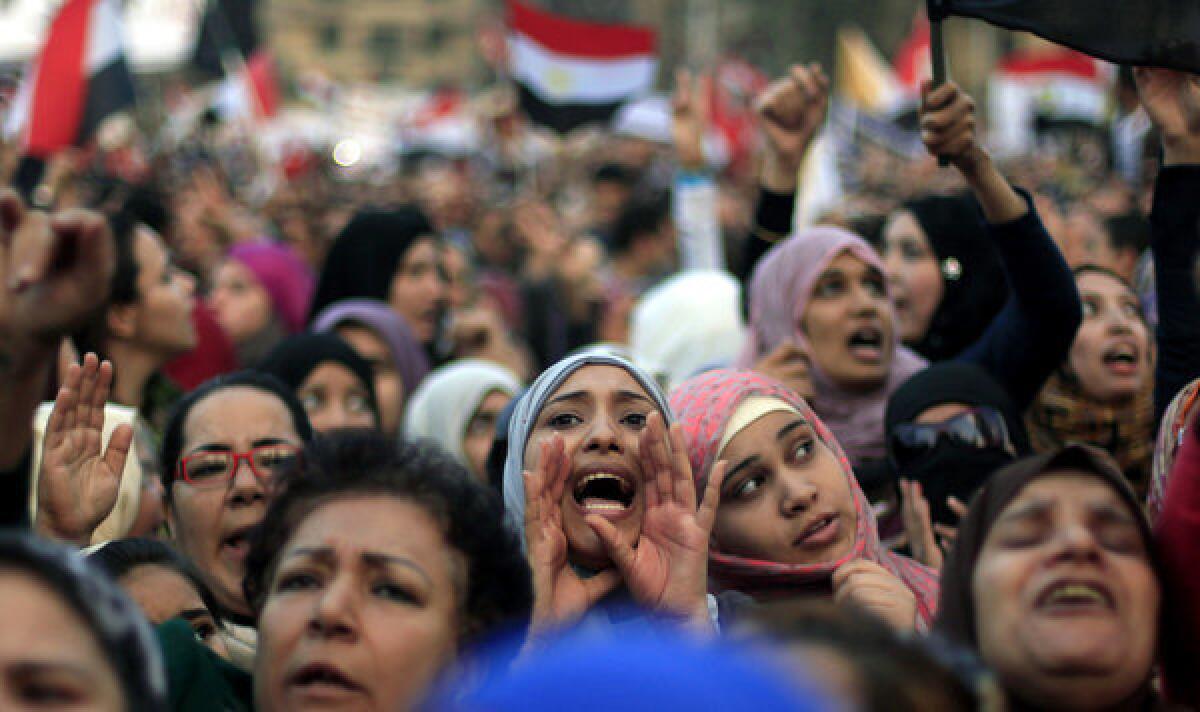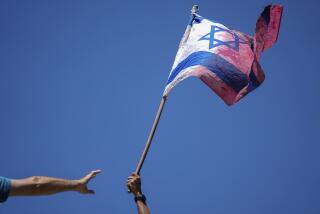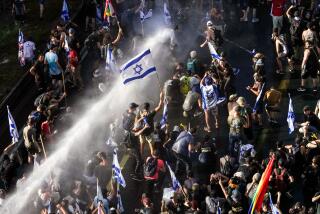Egyptians pour into Tahrir Square to protest presidential decree

- Share via
CAIRO -- Tens of thousands of Egyptians gathered in the capital and other major cities across the nation Tuesday demanding that Islamist President Mohamed Morsi rescind a self-issued constitutional decree that gives him sweeping powers.
Egyptians marched with families and friends across Cairo to converge in Tahrir Square, chanting the “people demand the fall of the regime,” the same slogan that crowds yelled last year in opposition to longtime President Hosni Mubarak.
One young woman held a sign that read in Arabic: “Oh Morsi, after the throne, there will be the prison cell ... Just ask Mubarak.”
PHOTOS: Protesters fill Egypt’s Tahrir Square
Crowds swelled through later afternoon and evening. Opposition figures, including Nobel Peace Prize-winner Mohamed ElBaradei and former presidential candidate Hamdeen Sabahi reportedly led marches from different parts of the capital.
Tahrir Square, the epicenter of last year’s 18-day uprising that toppled Mubarak after his three-decade rule, brims with defiance again, with more than 30 tents filled with protesters camping overnight and street vendors selling food, blankets and Egyptian flags. On side streets, hundreds of rock-throwing youths clashed with riot police firing volleys of tear-gas canisters.
Widespread anger against Morsi, former head of the Muslim Brotherhood’s Freedom and Justice Party, has been welling since Thursday, when he issued a decree that his office and the Islamist-dominated constitutional assembly would be immune from judicial oversight. Secularists, liberals and non-Muslims have accused the assembly of drafting a new constitution heavily influenced by sharia law.
[Updated, 1:32 p.m. Nov. 27: The Muslim Brotherhood reported that anti-Morsi demonstrators attacked its headquarters in Alexandria, Mahalla and Mansoura on Tuesday night. The Brotherhood’s website said the organization ordered the evacuation of its members from the Alexandria office to “avoid clashes and bloodshed.”
What the country “is witnessing now from Morsi is similar to Mubarak’s reactions to last year’s protests. When protesters went to the streets, they had clear demands of reform,” Ibrahim Ghaly, a political analyst, told Nile TV. “Mubarak ignored this and his regime resorted to violence. This resulted in the people eventually demanding his removal. This is what is happening now.”]
Protesters across Tahrir chanted the “people demand the fall of the Supreme Guide’s rule,” accusing Morsi of taking orders from the Muslim Brotherhood’s Supreme Guide.
“Our demands are the same, Morsi must revoke this declaration. We hoped he would be different than Mubarak,” said Gouda Ali Hassan, a government employee. “He can’t declare himself another pharaonic God and expect us to be silent.”
Morsi has also riled the nation’s judiciary by moving to fire Prosecutor General Abdel Meguid Mahmoud, a reviled Mubarak holdover, and announcing that if new evidence is found retrials would be held for officials and police charged with killing protesters during the 2011 uprising. His decree also stated that any decisions the president passed since inauguration in June, including the current declaration, would be irrevocable.
“Without an independent judiciary, the country’s legal infrastructure will fall and without laws, Egypt too will fall,” Hassan said.
Following Morsi’s decisions, shares on the Egyptian Stock Exchange’s main index dropped nearly 10%, costing the country’s already-troubled market unprecedented losses.
“This is a president who is supposed to unite Egyptians in these dark times, but instead he’s divided us. He needs to withdraw this decree immediately,” said Eman Tolba, a 40-year-old Egyptian woman marching to Tahrir from the posh Cairo district of Zamalek.
Although they had planned to hold a counter-demonstration supporting Morsi, Muslim Brotherhood supporters and other Islamist movements canceled their protests in Cairo in order to “avoid clashes and bloodshed.”
Despite growing anger since Morsi’s declaration, the Muslim Brotherhood dismissed anti-government protesters and accused them of creating a crisis for political gain.
“Today’s protesters are liberals, seculars and [regime remnants] uniting against an elected president whom they oppose. Egyptian national interests are out of the equation,” the Muslim Brotherhood said on its Twitter page. “We respect opposition’s right to protest, but it’s clear that political aspirations and ideological differences with [Muslim Brotherhood] are the spirit of Tahrir today.”
The nation’s troubling polarization become apparent Saturday when Morsi, explaining the reasons for his decree, spoke to his Muslim Brotherhood supporters outside the presidential palace instead of addressing the entire country on television.
So far, at least four people have died in violence and more than 500 have been wounded. One of those killed was a 15-year-old Muslim Brotherhood member who was attacked by anti-Morsi protesters in the port city of Damanhour. Meanwhile, on Saturday, a Freedom and Justice Party office was torched in Alexandria.
“We wanted a real revolution that institutionalized democracy and dependable laws that will secure our rights and freedoms; instead we got the Brotherhood, who only care about institutionalizing their interests and beliefs. We are going backwards,” said Mohamed Khalil, who traveled to Tahrir Square from the coastal city of Alexandria to protest.
Times staff writer Jeffrey Fleishman contributed to this report.
ALSO:
Netanyahu rival unveils new centrist Israeli political party
Syrian warplanes said to strike factory; at least 18 killed
France announces support for enhanced status for Palestinians at U.N.
More to Read
Sign up for Essential California
The most important California stories and recommendations in your inbox every morning.
You may occasionally receive promotional content from the Los Angeles Times.










